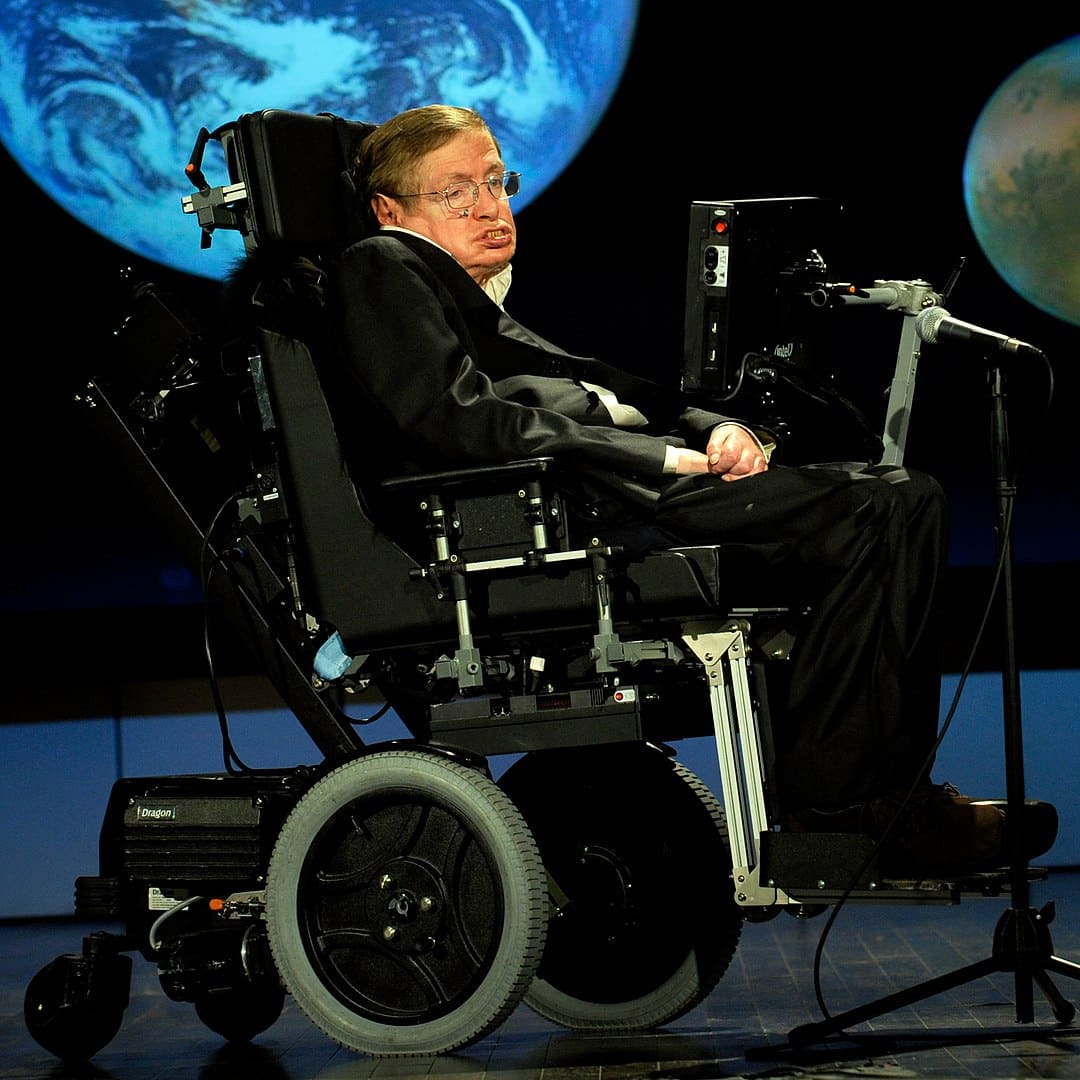Stephen Hawking once shared a chilling vision of how the world could end, and his warning feels more real today than ever before. The late physicist, known for his extraordinary mind and groundbreaking theories, believed that humanity’s greatest threats would not come from space or nature but from our own behavior. His words, once seen as distant speculation, now echo as an urgent reminder of the dangers we continue to create.
Stephen Hawking, one of the most brilliant scientists in history, served as the director of research at the Center for Theoretical Cosmology at the University of Cambridge. For decades, he explored the mysteries of the cosmos and deepened our understanding of time, space, and black holes. But as his health declined, his focus turned from the universe to the survival of humanity. He began warning that if we did not change our ways, human civilization might not last as long as we expect.
One year before he died in 2018, Stephen Hawking delivered one of his most alarming speeches.

Speaking at the 2017 Tencent WE Summit, he warned that unchecked population growth, rising energy use, and unstoppable technological progress could lead to catastrophic consequences. He described a future where Earth could turn into a “giant ball of fire” if humans continued their current pace of development. His prediction was not a fantasy; it was a scientifically reasoned warning about the limits of our planet.
He told the audience that human innovation showed no signs of slowing down. He even joked that by the time of “Star Trek,” about 300 years from now, technological growth would be unimaginable. But behind the humor was a serious message: exponential growth cannot continue forever. By the year 2600, he warned, the world’s population might be so large that people would stand shoulder to shoulder, and the energy consumption would make the Earth glow red-hot. It was an image that left listeners both fascinated and unsettled.
Stephen Hawking used vivid examples to explain the scale of human progress. He noted that if every new book published were stacked one after another, someone would have to travel at 90 miles an hour just to keep up with the end of the pile. Although he acknowledged that information would soon exist in electronic form, he emphasized that even digital progress could reach an unbearable speed. In his field of theoretical physics, he imagined ten new scientific papers being released every second; too many for anyone to read or comprehend. His point was clear: our rate of advancement might one day exceed our capacity to control it.
Beyond population and progress, Stephen Hawking worried about humanity’s destructive potential. He warned that uncontrolled growth, combined with human aggression and political tension, could lead to self-destruction. Nuclear war, he said, remained one of the most realistic threats to human survival. At the time, the world was already witnessing rising hostility between major powers, and Hawking’s warning felt timely and deeply relevant.
Today, his fears still resonate. Nine countries, including the United States, Russia, and North Korea, possess nuclear weapons. Political leaders have repeatedly referenced these arsenals as tools of intimidation, keeping the world in a constant state of unease. Hawking saw this as proof that intelligence alone was not enough to ensure survival. Without wisdom and restraint, the same brilliance that allowed us to create could just as easily destroy us.
The dangers Stephen Hawking warned about extended beyond Earth. He also spoke about the risks of searching for extraterrestrial life. Hawking believed that reaching out to alien civilizations could be dangerous. He suggested that there might be a grim reason why humans had never been contacted by beings from other worlds. Perhaps, he said, advanced civilizations often destroy themselves before they can communicate with others. It was a thought-provoking theory that connected cosmic curiosity with human vulnerability.
In a mix of humor and seriousness, he mentioned that UFOs might indeed contain aliens, though he could “not possibly comment” on whether governments were hiding evidence. While the remark was playful, it reflected his genuine concern about human curiosity leading to danger. He warned that if alien civilizations existed, they might not view us as equals. Instead, they could see Earth as a resource, not a home to protect.
Yet even extraterrestrial threats were not his main worry. Stephen Hawking believed that two man-made dangers: artificial intelligence and pandemics, could bring civilization to the brink. Decades before AI became widespread, he predicted that machines might one day surpass human intelligence. His concern was not about technology itself but about the lack of control humans might have once machines learned to think and act independently.
His warning now feels prophetic. Nearly 79 percent of Americans use AI every day, often without realizing it. Smart assistants, algorithms, and devices are now part of daily life. Reports suggest that the global AI industry could grow from 189 billion dollars in 2023 to more than 4.8 trillion by 2033. To many, this progress represents innovation and opportunity. But through the lens of Stephen Hawking’s warning, it also represents a risk; a reminder that rapid advancement can become dangerous if left unregulated.
Another major concern for Hawking was climate change. In a 2016 interview with the BBC, he called it one of the greatest dangers facing humanity. He explained that while the chance of disaster in any given year might seem small, over thousands of years it becomes almost certain. His reasoning was simple: small risks, multiplied over time, guarantee eventual consequences if left unaddressed. His message was not just scientific but moral: humans had a responsibility to protect the planet that gave them life.
Stephen Hawking pointed to the increasing levels of greenhouse gases and the accelerating warming of the planet. He warned that this process could spiral out of control, making Earth uninhabitable. Today, scientists say that the planet could surpass the 1.5°C global warming threshold within only a few years. Once that point is crossed, experts believe the damage to ecosystems and human life could be irreversible. Floods, droughts, and food shortages could become normal events rather than rare disasters.

Despite these grim predictions, Hawking was not without hope. He believed that humans had the intelligence to solve their own problems. While he described possible endings, he also insisted that we had time to change our path. Climate experts agree with that idea. By reducing carbon emissions and transitioning to renewable energy sources like solar and wind, humanity can slow down environmental decline. The goal, he said, was not perfection but progress.
Simple actions, multiplied by millions, can make a significant difference. Choosing sustainable transport, conserving energy, and supporting green policies can help ease the pressure on the planet. These steps may seem small, but collectively they can buy valuable time for future generations. The Stephen Hawking message reminds us that the future is not set in stone. Human beings have the power to shape it through awareness and responsible choices.
Some reports have suggested that NASA once supported Hawking’s apocalyptic theories, but the agency has publicly denied this. In an official statement, NASA clarified that it has always focused on studying and protecting Earth, not endorsing doomsday scenarios. The organization emphasized that science should guide us through facts, not fear. For Hawking, that belief was central to his philosophy: knowledge is the most powerful tool humanity possesses.
Stephen Hawking wanted people to think critically about progress. He admired innovation but feared arrogance. His warning was never meant to inspire despair; it was a call for responsibility. He urged scientists, politicians, and citizens alike to use technology with care and to think about long-term consequences. His legacy is a reminder that intelligence must always be balanced with humility.
Today, as technology evolves faster than ever, Hawking’s words sound prophetic. The modern world faces challenges he predicted years ago: rising temperatures, growing inequality, and ethical questions about artificial intelligence. The Stephen Hawking warning remains one of the most powerful voices from the scientific community, not because it predicts doom but because it calls for awareness. It invites humanity to pause, reflect, and choose wisely.
His life itself was proof of what humans can achieve against all odds. Despite living with a severe physical condition, he continued to teach, write, and inspire millions. His curiosity and determination symbolized hope in the face of difficulty. In the same way, his warnings should not discourage people but motivate them to build a better world.
Ultimately, the Stephen Hawking message is both a warning and an inspiration. It reminds us that our greatest strength, our intelligence, can also become our greatest threat if used carelessly. Whether the danger comes from climate change, technology, or conflict, the solution lies in awareness and unity. Humanity can still choose to act wisely, protect the planet, and secure a future worth living.
Stephen Hawking’s legacy continues to shape how people think about science, ethics, and survival. His words challenge us to look beyond comfort and face the reality of our impact. They remind us that knowledge is not enough; it must be paired with responsibility. The question he leaves behind is not whether the world will end, but whether we will learn to save it before it’s too late.
